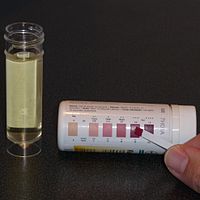
Photo from wikipedia
Ketogenic dietary therapies (KDTs) have been in use for refractory paediatric epilepsy for a century now. Over time, KDTs themselves have undergone various modifications to improve tolerability and clinical feasibility,… Click to show full abstract
Ketogenic dietary therapies (KDTs) have been in use for refractory paediatric epilepsy for a century now. Over time, KDTs themselves have undergone various modifications to improve tolerability and clinical feasibility, including the Modified Atkins diet (MAD), medium chain triglyceride (MCT) diet and the low glycaemic index treatment (LGIT). Animal and observational studies indicate numerous benefits of KDTs in paediatric neurological conditions apart from their evident benefits in childhood intractable epilepsy, including neurodevelopmental disorders such as autism spectrum disorder, rarer neurogenetic conditions such as Rett syndrome, Fragile X syndrome and Kabuki syndrome, neurodegenerative conditions such as Pelizaeus-Merzbacher disease, and other conditions such as stroke and migraine. A large proportion of the evidence is derived from individual case reports, case series and some small clinical trials, emphasising the vast scope for research in this avenue. The term 'neuroketotherapeutics' has been coined recently to encompass the rapid strides in this field. In the 100th year of its use for paediatric epilepsy, this review covers the role of the KDTs in non-epilepsy neurological conditions among children.
Journal Title: Annals of Indian Academy of Neurology
Year Published: 2021
Link to full text (if available)
Share on Social Media: Sign Up to like & get
recommendations!